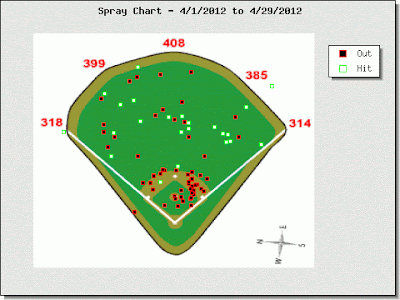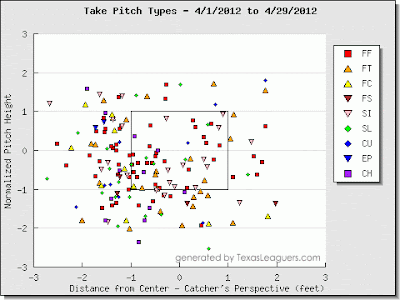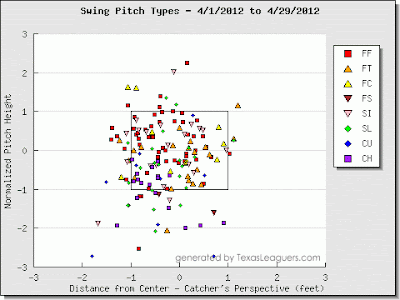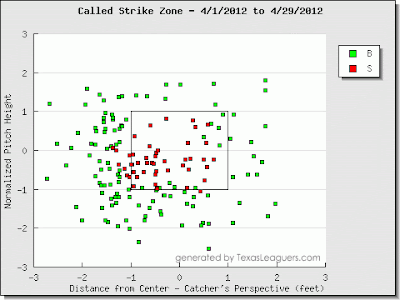Where For Art Thou, Robinson?
(The following is being syndicated from An A-Blog for A-Rod)
The lack of production from the middle of the Yankee lineup this season is a theme that probably deserves more time and space to discuss than it’s gotten so far. There have been a few big games here and there, but in general the trio of , , and has been pretty mediocre, and lucky that the rotation has been even worse. For guys like A-Rod and Teix, with injury histories, track records of slow starts, and swing/approach adjustments that they’re focusing on, the slow start can be understood to a degree. For Cano, however, his sluggish start comes as a surprise. This is a guy who hit .320/.340/.639 last April and has a .294/.335/.480 slash in the season’s first month in his career, and yet currently sits at .264/.323/.391 (.312 wOBA) 96 plate appearances into the season. A glance at Cano’s peripherals to try to explain this slow start makes the situation all the more confusing.
With Cano, the logical first place to start when investigating problems is his selectivity. Cano has always been a free swinger with a low BB rate, and those things tend to manifest themselves as bigger problems in his game when he’s slumping. This has not been the case this year, as Cano’s current BB rate of 8.3% is consistent with where it was in his banner year of 2010. He’s also sporting a minute 7.3% K rate, indicating that Cano isn’t flailing away and missing at a lot of pitches. His PITCHF/x Swing Rate of 46.0%, O-Swing Rate of 25.6%, and SwStr Rate of 6.2% are also lower than they usually are for Cano, significantly lower in the case of the Swing Rates, and support the theory that Cano has been more selective and less swing-happy at the plate this year. In theory, a hitter of Cano’s caliber should have much better numbers with across-the-board improvements in the swing/take department. Something’s not adding up here.
The smoking gun can be found in Cano’s contact splits, which are way off from where they usually are. His LD rate of 21.0% is solid, and actually 2nd only to the LD rate he posted last season in terms of career rankings, but his GB/FB splits are drastically different than what Cano historically puts up. Cano’s GB rate is 54.3%, which would be a career high for him and the first time he’s posted a GB rate above 47.4% since 2007. His FB rate of 24.7% is also alarmingly off from Cano’s usual breakdown, and it would be the first time since ’06 that Cano finished with a FB rate below 30.0%. The solid LD rate combined with Cano’s extremely low .275 BABIP can speak to the existence of some bad luck here and there, but the drastic shifts in GB/FB ratio suggests something more than that.
As bad as Cano’s general contact rates are, the GB splits to all fields are even worse. Cano is hitting 51.5% of his balls in play to center field on the ground, and an astounding 73.3% of his balls in play to right field on the ground. This has led to a .291 wOBA to center so far and a .272 wOBA to right, both of which are well off of Cano’s career values in those departments (.373 career wOBA to center, .417 to right). Suddenly, Cano has gone from a guy with power and contact skills to all fields to a reverse left-handed Mark Teixeira; he’s doing damage hitting the ball the opposite way to left, but has been much less effective to center and even worse to the pull side where he’s rolling over and hitting everything into the ground.
To tie these two seemingly unrelated topics together, let’s go back to the pitch selection. The increased BB rate and decrease in Swing rates suggest that Cano has gone back to what made him so successful in 2010 and focused on taking more pitches and swinging at fewer bad ones. That should result in more pitches seen per plate appearance, but check that stat and you’ll see that Cano is averaging just 3.375 P/PA. Whether you’re a hitter who prides himself on working counts or a hacker, 3.375 pitches per PA is low, and it makes Cano’s numbers even more difficult to explain.
This brings me to a point in Sunday’s game, I believe during Cano’s 2nd AB, when and Ron Darling discussed Cano’s poor start and talked about the changes in approach that pitchers were taking with Cano. According to them, word around the AL is that throwing Cano hard inside early and making him move his feet takes him out of his comfort zone a bit and allows pitchers to attack him more away with their offspeed stuff. Sure enough, the next pitch to Cano was way inside and he had to dance back to avoid taking a pitch off the thigh. Now he ended that at-bat with a single, but checking the pitch location breakdown, there might be something to that theory.
There aren’t a ton of inside pitches shown in the charts above, but there is a smattering of fastballs inside, almost all of them taken, and a lot of pitches to the outer half and beyond that lend credence to this approach being real.
This is a bit convoluted, but adding all these pieces up, here’s what I believe is happening to Robbie. Pitchers are making an adjustment to Cano’s zone coverage skills and trying to pitch him in early, even if it’s not a strike, to set him up away. Cano is attempting to combat this approach by laying off more pitches on the outside, and sometimes drawing himself walks in the process as a result of pitchers showing him respect and opting to walk him if they miss outside rather than groove a fastball for a strike. But as a free swinger, Robbie’s belief is he’s up there to swing the bat and hit the ball, so when he does get a pitch early in the count to hit, he’s taking his hacks, knowing that it might be the only time in the at-bat that he gets something good. Perhaps some of those pitches aren’t exactly where he wants them and perhaps he’s getting a bit antsy on the outside and rolling over on those pitches, creating the spike in groundballs that we’ve seen from him thus far and sapping his power to center and right field. In his attempt to adjust to pitchers adjusting to him, Cano has basically started doing what he never used to do- swing at bad pitches to hit and make weak contact.
Robbie has always been a hitter with a relatively even contact breakdown and the ability to hit to all fields well. It’s what’s made him so dangerous and allows him to be one of the few Yankee lineup regulars who can consistently be labeled as a big threat regardless of what hand the opposing pitcher is using to throw the ball. That hasn’t been the case early on in 2012. Whether it’s in response to a change in approach from opposing pitchers, some mechanical flaws in his swing, bad luck, or a combination of everything, Cano is not hitting up to the level we’ve come to expect. He seems caught in the middle on how to adjust his game to fix the problems and nothing like the version of himself that we know and love. There hasn’t been a whole lot of chatter from Joe, Kevin Long, or Cano himself about what’s going on, but a few more weeks of numbers like this and it might be time to rethink his current strategy.
(All pitch graphs courtesy of Texas Leaguers)
9 Responses to Where For Art Thou, Robinson?
Leave a Reply Cancel reply
-
LIKE TYA ON FACEBOOK
-
Recent Activity
Recent Posts
- Can Rivera return in 2012?
- Hughes Showing Glimpses of Hope
- The post I never thought I’d have to write
- Hitting Woes Continue In Third Straight Loss
- Rivera Carted Off the Field with a Knee Injury
- Game 25: Nixing the Nunez Experiment?
- Injecting some optimism into the Yankees’ 2012
- Could The Hot Start Help Derek Jeter Make History?
- The Rotation Is Killing Me, Smalls
- Series Preview: Yanks vs. Royals. Glad it’s not August
Recent Comments
- on Hughes Showing Glimpses of Hope
- Bo Knows on The Rotation Is Killing Me, Smalls
- John on Hughes Showing Glimpses of Hope
- A M on Is Eduardo Nunez’ Poor Defense a Team Error?
- Scout on Hughes Showing Glimpses of Hope
- on Hughes Showing Glimpses of Hope
- Duh Innings on Hughes Showing Glimpses of Hope
- The post I never thought I’d have to write | All New York Yankees on Life After Mo
- Phil C on The post I never thought I’d have to write
- Duh Innings on The post I never thought I’d have to write
-
Authors
Twitter
* TYA Twitter -
* EJ Fagan -
* Matt Imbrogno -
* William J. -
* Larry Koestler-
* Moshe Mandel -
* Sean P. -
* Eric Schultz -
* Matt Warden -
-
Most poker sites open to US players also provide online casinos accepting USA players. A good example of this is BetOnline.com, where you can play 3D casino games, bet on sports or play poker from anywhere in the United States.
-
Other Links
-
Blogroll
Blogs
- An A-Blog for A-Rod
- Beat of the Bronx
- Bronx Banter
- Bronx Baseball Daily
- Bronx Brains
- Don't Bring in the Lefty
- Fack Youk
- It's About The Money
- iYankees
- Lady Loves Pinstripes
- Lenny's Yankees
- New Stadium Insider
- No Maas
- Pinstripe Alley
- Pinstripe Mystique
- Pinstriped Bible
- River Ave. Blues
- RLYW
- Steven Goldman
- The Captain's Blog
- The Girl Who Loved Andy Pettitte
- The Greedy Pinstripes
- This Purist Bleeds Pinstripes
- Value Over Replacement Grit
- WasWatching
- Yankee Source
- Yankeeist
- Yankees Blog | ESPN New York
- Yankees Fans Unite
- YFSF
- You Can't Predict Baseball
- Zell's Pinstripe Blog
Writers
- Bats (NYT)
- Blogging the Bombers (Feinsand)
- Bombers Beat
- Buster Olney
- E-Boland
- Jack Curry
- Joe Posnanski
- Joel Sherman
- Jon Heyman
- Keith Law
- Ken Davidoff
- Ken Rosenthal
- LoHud Yankees Blog
- Marc Carig
- Tim Marchman
- Tom Verducci
Resources
- Baseball Analysts
- Baseball Musings
- Baseball Prospectus
- Baseball Think Factory
- Baseball-Intellect
- Baseball-Reference
- BBTF Baseball Primer
- Beyond the Box Score
- Brooks Baseball
- Cot's Baseball Contracts
- ESPN's MLB Stats & Info Blog
- ESPN's SweetSpot Blog
- FanGraphs
- Joe Lefkowitz's PitchFX Tool
- Minor League Ball
- MLB Trade Rumors
- NYMag.com's Sports Section
- TexasLeaguers.com
- THE BOOK
- The Hardball Times
- The Official Site of The New York Yankees
- The Wall Street Journal's Daily Fix Sports Blog
- YESNetwork.com
-
Site Organization
Categories
Tags
A.J. Burnett ALCS Alex Rodriguez Andy Pettitte Baltimore Orioles Bartolo Colon Boston Red Sox Brett Gardner Brian Cashman Bullpen CC Sabathia Chien-Ming Wang Cliff Lee Curtis Granderson David Robertson Dellin Betances Derek Jeter Francisco Cervelli Freddy Garcia Game Recap Ivan Nova Javier Vazquez Jesus Montero Joba Chamberlain Joe Girardi Johnny Damon Jorge Posada Manny Banuelos Mariano Rivera Mark Teixeira Melky Cabrera Michael Pineda Minnesota Twins New York New York Yankees Nick Johnson Nick Swisher Phil Hughes Prospects Red Sox Robinson Cano Russell Martin Series Preview Tampa Bay Rays Yankees -
Site Stats








Note- Stats have not been updated to account for Cano’s ABs last night. My bad.
Based on the spray chart, it seems like his pulled balls don’t have much behind them.
disconcerting but still early enough and shallow enough to be a sliump. he isnt hiitin 120 so a good two week cano type stretch will end this. hell one 4-5 with a 2b and hr and his numbers will make us all more comfortable. but it does bear monitoring.
He will go through a month where you cant get him out soon enough. Its not even an awful slump that he has to work out of all season. His numbers will be fine by the end of May.
I don’t think that headline means what you think it means.
Might not. I slept through most of Billy Shakes in high school.
There’s always the Leo DiCaprio Romeo + Juliet from back in the day. Good stuff. Not to be pedantic, but “wherefore are thou” means “why”. As is in, “Why are you Romeo”, scion of my dad’s enemy, rather than my own kin, who I could totally bone, because hey, it’s Italy in the Renaissance.
#themoreyouknow
Who’s stats would you rather have at this point in the season? Cano or Poljols?